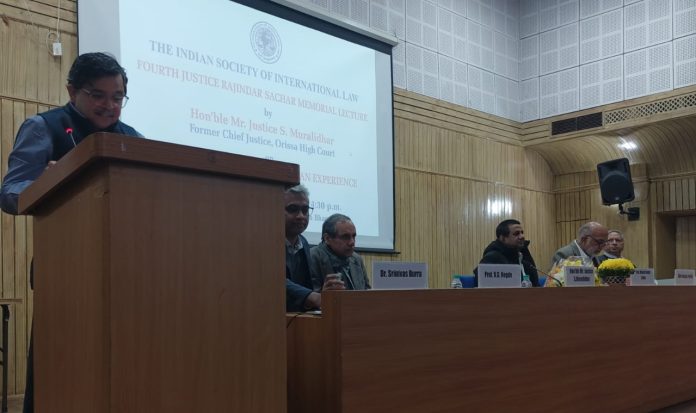New Delhi: Justice S. Muralidhar, former Chief Justice of Orissa High Court and currently a senior advocate practising in the Supreme Court, delivered the fourth Justice Sachar Memorial Lecture on Friday. Organised by the Indian Society of International Law at V.K. Krishna Menon Bhawan, his lecture was a tribute to Justice Sachar’s fearless legacy and an exploration of civil liberties in India.
Reflecting on Justice Rajinder Sachar’s remarkable contributions, Justice Muralidhar said, “Justice Sachar never wavered in the face of power. Even during challenging times in court, his conviction and courage were exemplary. For lawyers like me who entered the bar during his era, he was a constant source of inspiration. Despite his vast experience, he remained grounded, warm, and compassionate. I often wonder what Justice Sachar would have said if he were with us today – he would undoubtedly urge us to persevere and move forward.”
Justice Muralidhar framed his lecture, titled “Civil Liberties and the Indian Experience,” with a recent judgment by the Bombay High Court. The division bench of Justice Sonak and Justice Jitendra Jain quashed a directive by the Maharashtra Charity Commissioner that ordered public trusts to remove terms like ‘Bhrashtachar Nirmulan Mahasangh,’ ‘Bhrashtachar Virodhi Andolan,’ and ‘Human Rights’ from their titles.
The judgment, he noted, raises significant questions about the freedom of thought and expression in a democracy. He invoked George Orwell’s dystopian novel 1984, highlighting the concept of “thought crimes,” where oppressive states repress dissenting ideas even before they are expressed.
Drawing parallels, he said, “In Orwell’s world, language is weaponised through ‘Newspeak,’ a restricted vocabulary designed to eliminate dissent and limit critical thinking. Words like liberty, equality, and privacy become threats to the establishment.”
Justice Muralidhar expressed concern over the increasing tendency to suppress fundamental freedoms in India. “We are at a stage in our country’s history where attempts to control thought are more deliberate and frequent. Cases are being filed over ideas that would not have faced such scrutiny two decades ago. This conscious effort to repress the freedom of thought and expression strikes at the heart of democracy and the rule of law.”
He emphasised the importance of publicising and discussing the Bombay High Court’s judgment to safeguard civil liberties.
Justice Muralidhar lauded the efforts of organisations like the People’s Union for Civil Liberties (PUCL) and the People’s Union for Democratic Rights (PUDR), which have played pivotal roles in advocating for social justice, equality, and human rights. Their interventions, he said, have led to transformative laws such as the Right to Information Act and the Food Security Act.
He urged human rights organisations and defenders to remain vigilant, transparent, and proactive in their efforts to uphold democracy and social justice.
Justice Muralidhar concluded his address by reciting Faiz Ahmed Faiz’s iconic Urdu poem, Hum Dekhenge, symbolising hope and resilience in the face of adversity.
The programme also featured remarks from Professor V.G. Hegde (Executive President, ISIL), Senior Supreme Court advocate Sanjay Parikh, Manoj Kumar Sinha (President, ISIL), Narinder Singh (General Secretary, ISIL), and Dr. Srinivas Burra.




